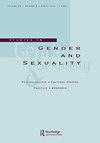Fanon’s Decolonial Transcendence of Psychoanalysis
Q3 Social Sciences
引用次数: 1
Abstract
ABSTRACT Coloniality continues to invade the psychomaterial lives of the condemned. Invoking psychoanalysis and phenomenology to engage with modern psychopathologies and race, gender, and sexuality, Fanon developed seminal ideas on social suffering in the context of colonial violence on psychic life. In reading Fanon, we discern two challenges: the decolonial transcendence of psychoanalysis as a theoretical framework, and the decolonial transcendence of psychoanalysis as a practice. These challenges are integral to the transcendence of disciplines and healing practices, and the requirement to develop a “multidimensional investigation” of human beings in the face of alterity and sociality in human reality. Fanon’s decolonial turn in psychoanalysis offers the makings of a decolonial and Fanonian oath for healing, of which decolonial love is a central principle. Our instantiation of transcendence of practice orients toward the provisions for a decolonial and Fanonian oath for healing, animated through epistemic agency, politico-affectivity, actional consciousness, and radical relationality.法农精神分析的非殖民化超越
殖民主义继续侵犯着被判刑者的精神物质生活。法农援引精神分析和现象学与现代精神病理学以及种族、性别和性行为相结合,在殖民暴力对精神生活的背景下,发展了关于社会苦难的开创性思想。在阅读《法农》时,我们看到了两个挑战:作为理论框架的精神分析的非殖民化超越和作为实践的精神分析非殖民化超越。这些挑战是对学科和治疗实践的超越所不可或缺的,也是面对人类现实中的交替性和社会性对人类进行“多维调查”的要求。法农在精神分析中的非殖民化转向为治愈提供了非殖民化和法农式的誓言,其中非殖民化的爱是核心原则。我们对实践超越的实例化指向非殖民化和法农式治愈誓言的规定,通过认识能动性、政治情感、行动意识和激进关系来激励。
本文章由计算机程序翻译,如有差异,请以英文原文为准。
求助全文
约1分钟内获得全文
求助全文
来源期刊

Studies in Gender and Sexuality
Social Sciences-Gender Studies
CiteScore
0.80
自引率
0.00%
发文量
15
期刊介绍:
Beginning in the final two decades of the 20th century, the study of gender and sexuality has been revived from a variety of directions: the traditions of feminist scholarship, postclassical and postmodern psychoanalytic theory, developmental research, and cultural studies have all contributed to renewed fascination with those powerfully formative aspects of subjectivity that fall within the rubric of "gender" and "sexuality." Clinicians, for their part, have returned to gender and sexuality with heightened sensitivity to the role of these constructs in the treatment situation, including the richly variegated ways in which assumptions about gender and sexuality enter into our understandings of "normality" and "pathology."
 求助内容:
求助内容: 应助结果提醒方式:
应助结果提醒方式:


